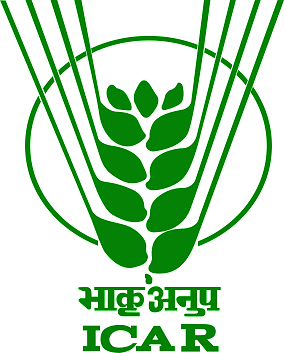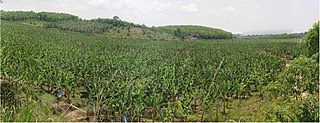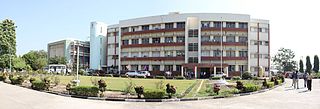Related Research Articles

The economy of Rwanda has undergone rapid industrialisation due to a successful governmental policy. It has a mixed economy. Since the early-2000s, Rwanda has witnessed an economic boom, which improved the living standards of many Rwandans. The President of Rwanda, Paul Kagame, has noted his ambition to make Rwanda the "Singapore of Africa". The industrial sector is growing, contributing 16% of GDP in 2012.

The International Institute of Tropical Agriculture (IITA) is a nonprofit organization that works with partners to enhance crop quality and productivity, reduce producer and consumer risks, and generate wealth from agriculture, with the ultimate goals of reducing hunger, malnutrition, and poverty. IITA's research-for-development (R4D) focuses on addressing the development needs of tropical countries. The institute was established in 1967 and headquarters located in Ibadan, Nigeria, with several research stations spread across Africa. The organization is governed by a Board of Trustees, supported by several countries and the Consultative Group on International Agricultural Research (CGIAR).

The Indian Council of Agricultural Research (ICAR) is an autonomous body responsible for co-ordinating agricultural education and research in India. It reports to the Department of Agricultural Research and Education, Ministry of Agriculture. The Union Minister of Agriculture serves as its president. It is the largest network of agricultural research and education institutes in the world.
Bharathidasan Institute of Management, Tiruchirappalli is an Indian business school established in 1984 in Trichy, Tamil Nadu, India. The school offers AICTE approved full-time MBA program, doctoral programs, and many executive education programs. The college is often ranked among the well known Business Schools of the country ever since its inception.

The U.S. African Development Foundation (USADF) is an independent U.S. government agency established by Congress in 1980 to invest directly in African grassroots enterprises and social entrepreneurs. USADF's investments aim to increase incomes, revenues, and jobs by promoting self-reliance and market-based solutions to poverty. USADF targets marginalized populations and underserved communities in the Sahel, Great Lakes, and the Horn of Africa. It partners with African governments, other U.S. government agencies, private corporations, and foundations to achieve transformative results.

Maraba coffee is grown in the Maraba area of southern Rwanda. Maraba's coffee plants are the Bourbon variety of the Coffea arabica species and are grown on fertile volcanic soils on high-altitude hills. The fruit is handpicked, mostly during the rainy season between March and May, and brought to a washing station in Maraba, where the coffee beans are extracted and dried. At several stages, the beans are sorted according to quality. The farmers receive credits based on the amount and quality of the beans they provide.

Mount Huye is a mountain located near to the city of Butare in southern Rwanda. It is connected by a ridge to Nyungwe Forest to the west, and is on the outer edges of the Albertine Rift, the western branch of the East African Rift. The mountain is an important source of mineral water, supplying both the Huye bottled water brand sold throughout Rwanda and the nearby Maraba fair trade coffee plant, whose washing station receives Huye water via a pipeline built using ACDI/VOCA funding in 2002.

The Philippines' Bureau of Agricultural Research, is an agency of the Philippine government under the Department of Agriculture responsible for ensuring that all agricultural research is coordinated and undertaken for maximum utility to agriculture.
The agricultural policy of the United States is composed primarily of the periodically renewed federal U.S. farm bills. The Farm Bills have a rich history which initially sought to provide income and price support to US farmers and prevent them from adverse global as well as local supply and demand shocks. This implied an elaborate subsidy program which supports domestic production by either direct payments or through price support measures. The former incentivizes farmers to grow certain crops which are eligible for such payments through environmentally conscientious practices of farming. The latter protects farmers from vagaries of price fluctuations by ensuring a minimum price and fulfilling their shortfalls in revenue upon a fall in price. Lately, there are other measures through which the government encourages crop insurance and pays part of the premium for such insurance against various unanticipated outcomes in agriculture.

Agriculture was the foundation of the economy in Ivory Coast and its main source of growth. In 1987 the agricultural sector contributed 35 percent of the country's GDP and 66 percent of its export revenues, provided employment for about two-thirds of the national work force, and generated substantial revenues despite the drop in coffee and cocoa prices. From 1965 to 1980, agricultural GDP grew by an average 4.6 percent per year. Growth of agricultural GDP from coffee, cocoa, and timber production, which totaled nearly 50 percent of Ivory Coast's export revenues, averaged 7 percent a year from 1965 to 1980.

Coffee production has been a major source of income for Vietnam since the early 20th century. First introduced by the French in 1857, the Vietnamese coffee industry developed through the plantation system, becoming a major economic force in the country. After an interruption during and immediately following the Vietnam War, production rose once again after Đổi mới economic reforms, making coffee second only to rice in value of agricultural products exported from Vietnam.
These are some of the articles related to Rwanda on the English Wikipedia pages:

The International Growth Centre (IGC) is an economic research centre based at the London School of Economics, operated in partnership with University of Oxford's Blavatnik School of Government.
The Indian Institute of Rice Research (IIRR), formerly the Directorate of Rice Research, is a rice research institute located in Rajendranagar near Hyderabad, Telangana.
Ghana'sMinistry of Food and Agriculture (MOFA) is the government agency responsible for the development and growth of agriculture in the country. The jurisdiction does not cover the cocoa, coffee, or forestry sectors. The primary organisation and main area of the presidential administration of Ghana is the nation's Ministry of Food and Agriculture (MOFA), which is in charge of creating and carrying out policies and plans for the agricultural sector within the framework of an efficient national socio-economic development and prosperity agenda. The Ministry's plans and programmes are created, coordinated, and put into effect using frameworks for policy and strategy using a sector-wide approach. The Food and Agriculture Sector Development Policy II and the Medium Term Agriculture Sector Investment Plan were both developed with the aid of MOFA in relation to this.
Crops For the Future, known by its acronym CFF, is an independent international organisation with a mandate to promote and facilitate the greater use of neglected and underutilised crops for enhanced diversification of agricultural systems and human diets, particularly for the benefit of poor people in developing countries. Crops for the Future is the only such organisation exclusively dedicated to an agenda increasingly recognised as important to achieving food security in a sustainable manner and making use of local agricultural biodiversity. Crops for the Future is based in Semenyih, Malaysia, and is governed by a Board of Directors, including a representative of the Government of Malaysia.

Community Coffee is a coffee roaster and distributor based in Baton Rouge, Louisiana, United States. As of 2005, it was the largest family-owned coffee brand in the United States, controlling 52% of the market in South Louisiana and 72% in Baton Rouge, and employing 850 people. The company has distribution throughout markets in the Southeastern United States.

ICAR - Directorate of Groundnut Research (ICAR-DGR) formerly known as National Research Centre for Groundnut is a premier national level institute set up by the Indian Council of Agricultural Research, Ministry of Agriculture of India to cater to the needs of agricultural science research in the field of groundnut (peanut) crop in India. ICAR-DGR was established in 1979, Gujarat to give a fillip to research for enhancing productivity of groundnut in keeping with its importance among the oilseed crops of India. The research centre came into being as the first crop commodity research unit under the category of NRC's of the Indian Council of Agricultural Research, as an autonomous body set up as a registered society. The National Research Centre on Groundnut (NRCG) was elevated to the level of a Directorate in the year 2009 and rechristened as the Directorate of Groundnut Research.

The African Forum for Agricultural Advisory Services (AFAAS), is an African organization for strengthening Agricultural Extension and Advisory Services (AEAS) in Africa. It operates within the framework of the Comprehensive Africa Agriculture Development Programme (CAADP), a venture of the African Union in the New Partnership for Africa's Development (NEPAD). AFAAS is an autonomous subsidiary of the Forum for Agricultural Research in Africa (FARA).
Science and technology in Uganda refers to the growth within the technological industry in response to government efforts to develop a national innovation system, as well as any subsequent socioeconomic and cultural impacts of these endeavours.
References
- ↑ "Coffee rebound perking up Rwanda's economy | the Seattle Times".
- ↑ "Strategic Plan for the Transformation of Agriculture in Rwanda — Phase 11 (PSTA 11)" (PDF). 2022-03-01.
- ↑ "Evaluation of the PEARL Project- Partnership for Enhancing Agriculture in Rwanda through Linkages". www.aiaee.org. Retrieved 2022-04-17.
- ↑ "World Coffee Research | Dr. Timothy Schilling: A Life in Coffee". World Coffee Research. Retrieved 2022-04-17.
- ↑ "Rwanda to the World: Celebrating 10 years of Rwandan Specialty Coffee | Mercanta" . Retrieved 2022-04-17.
- ↑ "White Paper: Cupper's Guide - Rwanda". Union Coffee. Retrieved 2022-04-17.